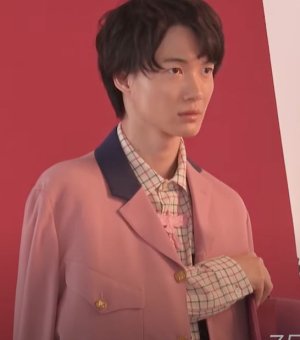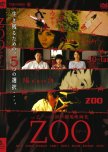This review may contain spoilers
Honestly. "So-Far" might be one of the most terrifying things I've ever seen.
Honestly. "So-Far" might be one of the most terrifying things I've ever seen.
“I want you to learn about death.”
-The Scientist (No idea who voiced him, as little information is available on this anywhere and I can’t read the Japanese credits)
I’ve always personally had a thing for anthology films, particularly those within the horror genre. I guess the attraction stems partly from the marvel at any filmmaker whom can make anywhere between a 25-40 minute story as effective as one lasting say, 2 whole hours, and also because it’s very much a ‘lucky dip’ format for film. Variety is the spice of life, and the unexpected is that which excites the most. As such, this sub-genre has found a place in my heart, despite (or perhaps because of) the variation in quality. Though the anthology film was at its most popular during the 1970’s and 1980’s, it has recently seen a bit of a revival, especially in Asia, which has produced a handful of real gems recently.
Zoo is one such gem, one of the most underrated and criminally underseen anthologies ever made. Of course like all anthologies, one must approach with a certain amount of trepidation, but for me this is likely one of the most consistent in regards to quality, on par with the likes of Three…Extremes. Once more, I’ll opt for my anthology review format and give you the lowdown on each of the five segments from five upcoming Asian directors.
Kazari and Yoko
Directed by: Ryu Kaneda
The first segment, titled Kazari and Yoko and directed by Ryu Kaneda, follows a family in which one daughter is loved whilst the other is neglected by their single mother, taking parental favouritism to the next degree. This story is rather simple, but is not hindered by it and is actually rather good nonetheless. Ryôko Kobayashi plays both of the titular twins, Kazari and Yoko, and does well in a challenging role, and while she’s certainly no Margaret White the mother offers strong support. The tale it weaves is easy to follow, and builds to a twisted conclusion.
Seven Rooms
Directed by: Masaki Adachi
The second segment is one of the more interesting in the collection. Titled Seven Rooms, this entry first establishes itself with a premise not dissimilar with the likes of Saw or Hostel, as a brother and sister wake up to find themselves locked in a prison cell, alongside six other prisoners in separate cells.
The acting here is fine once again, whilst the director manages to create a palpable atmosphere of dread through the inevitability of the countdown, supported by a strong score. Whilst it could have been slightly more menacing, director Adachi does deserve credit for creating one of the more intriguing entries and rounding it off with a touchingly sad ending.
So-Far (So fa)
Directed by: Masatetsu Komiya
Thirdly is So-Far, and one of the finest from the selection in terms of overall quality. It also has far more emotional resonance than much of its fellow segments, primarily due to some sterling writing and fantastic performances from its three cast members. The premise it sets up is probably the most compelling, as a young boy’s parent’s return from a car accident to find they cannot see one another, and yet he sees both. This basic yet interesting concept kept me watching till its conclusion if only to find out where the story was headed and it is capped with a thoughtful finale.
When the Sun Shines (Hidamari no shi)
Directed by: Junpei Mizusaki
Fourth in the series is When the Sun Shines, and is perhaps my favourite of all the segments herein. It’s the only section that is animated rather than live action, but if anything it enhances the mediation on life and Death. The animation is actually rather interesting, a style unfamiliar to myself but visually impressive regardless. One could think it pretentious, in its subject of teaching a naïve synthetic about life and death, but I would argue it is handled delicately and thoughtfully. The colourful palate of the animation is perfectly juxtaposed to the dark content of the tale. It’s really quite the spectacle to watch and ends in lieu with the others with an emotional and melancholy end.
Zoo
Directed by: Hiroshi Ando
The fifth and final entry into the Japanese anthology is a slightly confusing ending to the collection. The plot, which concerns the almost obsessive love of a photographer for his girlfriend and his penchant for taking polaroid pictures of her that extends to dangerous lengths, is an enticing concept that is watchable in its horrific voyeurism. The acting is very good from the couple in the lead, whilst the grainy cinematography enhances the warped tale of lust. Ando display’s some assured direction (though not quite as strong as several other sections in the anthology), and the effects department create some disturbing imagery. Although the narrative is lost on me toward the finale, it is a creepy short and a fine ending to a great anthology series.
VERDICT; Overall, Zoo is easily one of the best Asian anthologies out there, and likely one of my favourite collection films full stop. The acting, cinematography and writing are all generally of the same level of good quality in each segment. The styles differ greatly between each, and there is no overarching or interlinking story connecting each (bar some similar themes, perhaps), but in its entirety this is a very fine anthology. I’d wager it’s one that hasn’t been seen by many, but if you get the chance I highly recommend it.
“I want you to learn about death.”
-The Scientist (No idea who voiced him, as little information is available on this anywhere and I can’t read the Japanese credits)
I’ve always personally had a thing for anthology films, particularly those within the horror genre. I guess the attraction stems partly from the marvel at any filmmaker whom can make anywhere between a 25-40 minute story as effective as one lasting say, 2 whole hours, and also because it’s very much a ‘lucky dip’ format for film. Variety is the spice of life, and the unexpected is that which excites the most. As such, this sub-genre has found a place in my heart, despite (or perhaps because of) the variation in quality. Though the anthology film was at its most popular during the 1970’s and 1980’s, it has recently seen a bit of a revival, especially in Asia, which has produced a handful of real gems recently.
Zoo is one such gem, one of the most underrated and criminally underseen anthologies ever made. Of course like all anthologies, one must approach with a certain amount of trepidation, but for me this is likely one of the most consistent in regards to quality, on par with the likes of Three…Extremes. Once more, I’ll opt for my anthology review format and give you the lowdown on each of the five segments from five upcoming Asian directors.
Kazari and Yoko
Directed by: Ryu Kaneda
The first segment, titled Kazari and Yoko and directed by Ryu Kaneda, follows a family in which one daughter is loved whilst the other is neglected by their single mother, taking parental favouritism to the next degree. This story is rather simple, but is not hindered by it and is actually rather good nonetheless. Ryôko Kobayashi plays both of the titular twins, Kazari and Yoko, and does well in a challenging role, and while she’s certainly no Margaret White the mother offers strong support. The tale it weaves is easy to follow, and builds to a twisted conclusion.
Seven Rooms
Directed by: Masaki Adachi
The second segment is one of the more interesting in the collection. Titled Seven Rooms, this entry first establishes itself with a premise not dissimilar with the likes of Saw or Hostel, as a brother and sister wake up to find themselves locked in a prison cell, alongside six other prisoners in separate cells.
The acting here is fine once again, whilst the director manages to create a palpable atmosphere of dread through the inevitability of the countdown, supported by a strong score. Whilst it could have been slightly more menacing, director Adachi does deserve credit for creating one of the more intriguing entries and rounding it off with a touchingly sad ending.
So-Far (So fa)
Directed by: Masatetsu Komiya
Thirdly is So-Far, and one of the finest from the selection in terms of overall quality. It also has far more emotional resonance than much of its fellow segments, primarily due to some sterling writing and fantastic performances from its three cast members. The premise it sets up is probably the most compelling, as a young boy’s parent’s return from a car accident to find they cannot see one another, and yet he sees both. This basic yet interesting concept kept me watching till its conclusion if only to find out where the story was headed and it is capped with a thoughtful finale.
When the Sun Shines (Hidamari no shi)
Directed by: Junpei Mizusaki
Fourth in the series is When the Sun Shines, and is perhaps my favourite of all the segments herein. It’s the only section that is animated rather than live action, but if anything it enhances the mediation on life and Death. The animation is actually rather interesting, a style unfamiliar to myself but visually impressive regardless. One could think it pretentious, in its subject of teaching a naïve synthetic about life and death, but I would argue it is handled delicately and thoughtfully. The colourful palate of the animation is perfectly juxtaposed to the dark content of the tale. It’s really quite the spectacle to watch and ends in lieu with the others with an emotional and melancholy end.
Zoo
Directed by: Hiroshi Ando
The fifth and final entry into the Japanese anthology is a slightly confusing ending to the collection. The plot, which concerns the almost obsessive love of a photographer for his girlfriend and his penchant for taking polaroid pictures of her that extends to dangerous lengths, is an enticing concept that is watchable in its horrific voyeurism. The acting is very good from the couple in the lead, whilst the grainy cinematography enhances the warped tale of lust. Ando display’s some assured direction (though not quite as strong as several other sections in the anthology), and the effects department create some disturbing imagery. Although the narrative is lost on me toward the finale, it is a creepy short and a fine ending to a great anthology series.
VERDICT; Overall, Zoo is easily one of the best Asian anthologies out there, and likely one of my favourite collection films full stop. The acting, cinematography and writing are all generally of the same level of good quality in each segment. The styles differ greatly between each, and there is no overarching or interlinking story connecting each (bar some similar themes, perhaps), but in its entirety this is a very fine anthology. I’d wager it’s one that hasn’t been seen by many, but if you get the chance I highly recommend it.
Was this review helpful to you?






